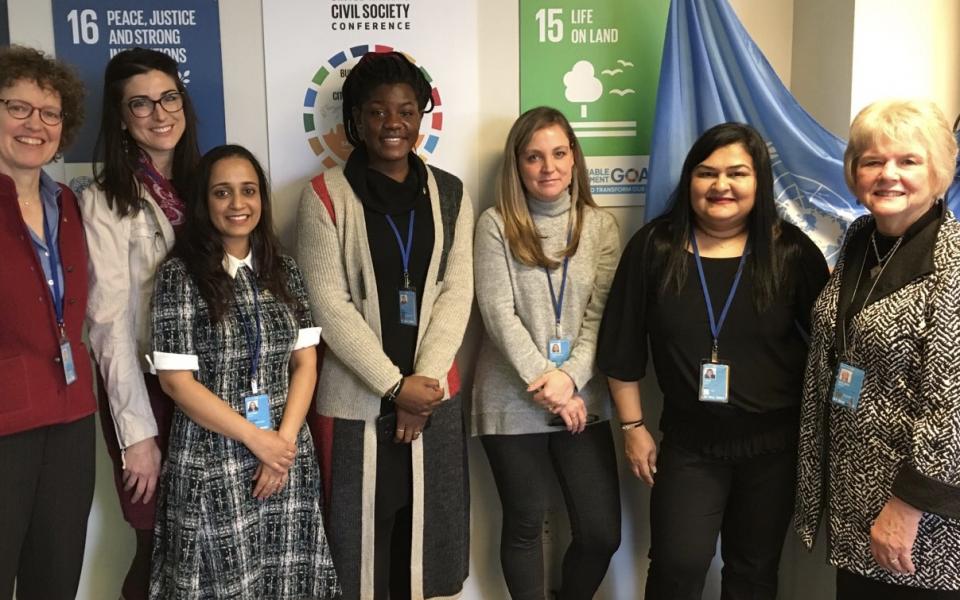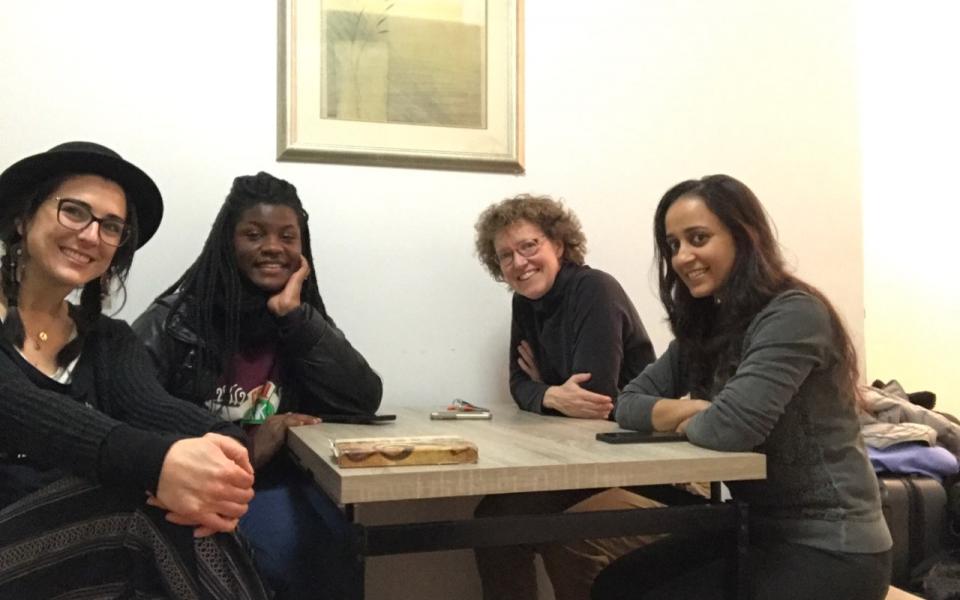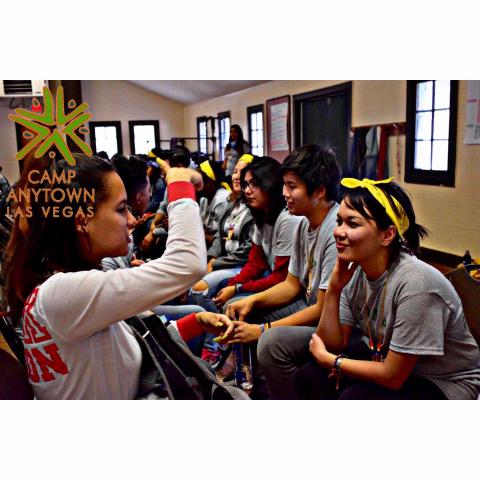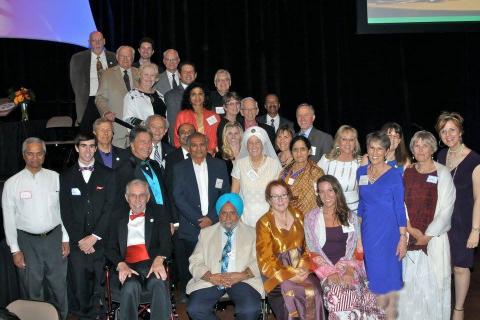During a recent trip to the United Nations sponsored by URI North America, Sanniyah Haye, a young leader from Camp Anytown Las Vegas, observed the values of respect and recognition in action.

Sanniyah (middle) participates in a meeting at the United Nations.
What did you experience at the UN that you think will have a long term effect on you?
Being in the UN I witnessed how the job and responsibility of making this world a better place relies not just on one person, nor a delegation, but the entirety of the leaders of the world itself, in cooperation with its grassroots circles. In the long term, I think that I have a greater understanding of importance that recognition and respect play in the process that the UN must uphold to make decisions on topics. By recognition I mean understanding another's full history -- acknowledging their pain, faults, triumphs, and success, and then using that to have a better idea of where another is coming from. So often, violence ensues, feuds arise, and ignorance is propelled forward because of a lack of these things. The UN is a diplomatic setting to address issues that are widely held and deeply shared, and therefore require the attention and convergence of nearly everyone. Respect and recognition are key to collaborating regardless of standing issues in history, religion, or ethnicity. During my visit, these values were the most upheld and esteemed morals that everyone could agree to uphold and follow. It is on this foundation that anything could be possible. With respect, all could have a voice and not be silenced because of age, gender, religion, or opinions. Respect guaranteed the audience of a room gave attention to a speaker, heard them, and considered what they had to say. With recognition, a speaker could be understood, especially in regard to their history and where they have come from. Recognition is offered to a person’s culture, to the trials of a people in a country, and wisdom gained through hardship or communications.
The decision making processes at the UN in and of itself is complicated in satisfying the wants and needs of everyone. But the respect and recognition I saw at the UN gave everyone a voice and allowed for processes, no matter how arduous and complicated, to follow in an efficient manner. Respect and recognition meant it wasn’t necessary to have time consuming conversation and confusion about a people or their hardships since problems are formally acknowledged. By knowing a person's culture the best method for a solution can be made a bit more efficiently; that is, there is the ability to know what will or will not work based on history.

Sanniyah (second from left) with fellow URI trip participants and URI Director of Global Programs Alice Swett (second from right).
What was it like to meet members from other URI Cooperation Circles?
To meet with the members from other Cooperation Circles of the URI was encouraging and inspiring. Meeting them gave me the chance to witness the values of my Cooperation Circle, Camp Anytown Las Vegas, to fight for equality, inclusivity, and diversity but in a different way. It was really cool to sit down and have deep discussions on how each of us worked and strove for a common goal. Hope and faith are my biggest takeaway words that come to mind when I think back to meeting with and spending time with, Richa from Think Round Inc and Kendra from the Arizona Interfaith Movement. It was heartening to see that the work that I do with Anytown, and the values I place in it do not just stop in Vegas. From meeting them I was able to find relief, knowing that elsewhere others are fighting for a better world like I am. Too often the world does not acknowledge the good work that people do in their communities to uplift and create change for the better of everyone and rather people like to control the media through a negative paradigm, only seeing the bad or what needs to be changed or what needs to be done. With the bad of each news report or story I think there needs to be an outreach to recognize the good of what’s being done as well.
What is a memory from this trip that you think will stick with you forever?
On the second day of the trip, around the Security Council Chamber, we came upon a recognition of the UN Peacekeepers in action. This was the most impactful thing I’d seen and gave me the bigger picture of what the UN really means at its core. Seeing one specific image of a peacekeeper retrieving water with a elderly woman in a village brought a tender tightness to my heart. In the image, I saw the difficulty of what was going on, as well as the joy and hope in the woman’s face. The mission of the UN at its core, to me, is to create a better world and future for the next generations. This made me think about how violence is never the answer because, as humans, we are thinking beings who can discuss problems civilly to come to a solution or compromise. We are not animals that need to breed destruction to solve conflict. Everything can be solved through enough discussion to the point where bloodshed is not needed. It would be nice if we could solve problems without violence, but the fact that the UN Peacekeeper has a gun firmly strapped to his chest would suggest otherwise. The UN’s mission is to solve things nonviolently. Peacekeepers still have to protect themselves to keep the peace going but it’s kind of idealistic. There is a back and forth between what’s reality and the peace mission we’re striving towards.
Peace and justice in this world are not free because of people who look to abuse and oppress the weak. The UN is meant to seek out and look for ways to end injustice and provide security to those who cannot defend themselves. Seeing the Peacekeepers in action like this brought out a reality that I hadn’t been privy to in a while. I am forever grateful to understand who is truly being fought for in the spaces we passed. I am grateful for those who are on the front lines -- those Peacekeepers in places like the Congo and Philippines who aid people and put themselves at risk, and those working on policy , and those who leave their homes behind to aid others to provide security and peace..
Another aspect of the trip I think will be with me for a while is the relationships I made with the others trip participants from other Cooperation Circle and those that I met in the UN and URI. It was enriching to hear about their experiences and the things that they have overcome to now speak with such wisdom and do what they do now. I am grateful to have been selected to meet such outstanding people with the passion to create justice, equality, and betterment for those around them.
Click here to read reflections from other trip participants.



